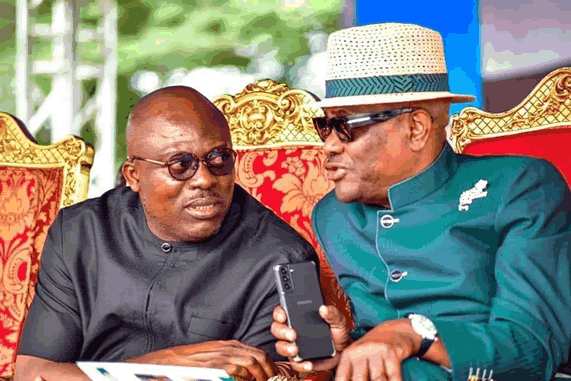The Presidency asserted yesterday that President Bola Tinubu would not align himself with either Minister of the Federal Capital Territory (FCT), Nyesom Wike, or Governor Siminalayi Fubara amidst the escalating political turmoil in Rivers State. Joseph Johnson, the state Commissioner for Information and Communications in Port Harcourt, emphasized that Ganduje lacks the legal basis to intervene in Governor Fubara’s potential impeachment. Additionally, Rivers State elders and leaders from both the Peoples Democratic Party (PDP) and the All Progressives Congress (APC), purportedly allied with FCT Minister Nyesom Wike, cautioned Governor Fubara against interfering with structures at the House of Assembly quarters.
Meanwhile, the court-suspended factional Speaker of the Rivers State House of Assembly, Martins Amaewhule, reiterated that the Assembly quarters’ structures were in optimal condition, fully operational, and presently inhabited by lawmakers and their families.
In another development, Rivers State youths urged President Bola Tinubu to intervene and reprimand his FCT Minister, Wike, for the ongoing political crisis in the state. Special Adviser on Media and Publicity to President Tinubu, Ajuri Ngelale, revealed this during a TVC interview.
Ngelale emphasized that those anticipating President Tinubu’s support in the political fracas would be mistaken. He stated that President Tinubu would ensure that all parties have the necessary resources to function effectively and would not tolerate any attempt to obstruct the Rivers State government’s operations for the benefit of its people.
He said: “I believe that anyone who believes that by their actions, whether it’s from the federal level, state level or the legislative branch in the state or the executive branch in the state, if they are banking on Mr. President to take sides on this matter, they’re mistaking and they’ll be disappointed. Mr. President will not do that. What he will do is to ensure that everybody has what they need in order to work. He will also ensure that any attempt to frustrate the operation of the Rivers State government in conducting its affairs in a way that it would benefit the Rivers people, that’s obviously is not going to be allowed by this President or anybody else. So, I think there’s a need for all stakeholders to understand that Mr. President won’t take sides.”
Analysis by NewsAnalytrics
The statement from the Presidency indicating that President Bola Tinubu would maintain neutrality amidst the political crisis in Rivers State carries several implications and potential repercussions:
- Political Neutrality: By affirming Tinubu’s impartial stance, the Presidency aims to project a sense of fairness and non-partisanship in addressing the ongoing conflict between Minister Nyesom Wike and Governor Siminalayi Fubara. This neutrality is crucial in fostering trust and confidence among stakeholders and preventing further escalation of tensions.
- Strategic Positioning: The decision to distance Tinubu from taking sides in the Rivers crisis suggests a calculated move to preserve his political capital and avoid entanglement in potentially divisive regional disputes. By positioning Tinubu as an arbiter rather than a participant, the Presidency aims to maintain his broader appeal and strategic influence across Nigeria.
- Diplomatic Intervention: While asserting Tinubu’s neutrality, the Presidency also signals a willingness to mediate and facilitate dialogue between conflicting parties in Rivers State. By refraining from endorsing any particular faction, Tinubu may serve as a potential mediator or facilitator in resolving the crisis, promoting stability, and safeguarding democratic processes.
- Regional Dynamics: The political crisis in Rivers State underscores broader tensions and power struggles within Nigeria’s political landscape, particularly between regional power brokers and federal authorities. Tinubu’s neutrality reflects a delicate balancing act to navigate these complex dynamics while upholding national unity and cohesion.
Overall, the Presidency’s declaration of Tinubu’s neutrality in the Rivers crisis underscores the importance of political stability, conflict resolution, and inclusive governance in Nigeria’s democratic trajectory. It highlights the need for constructive dialogue, compromise, and consensus-building to address underlying grievances and promote sustainable peace and development.


